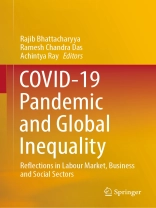The book intends to capture the most critical issue that has cropped up as an aftermath of the Corona pandemic- the phenomenon of widening of global inequalities across nations depending upon their economic position, support policies of the government and international relationship particularly in the context of alarming growth of unemployed in the labour market, business activity and social sector. This book is expected to provide new areas of research to both academicians and policy makers to re-think about global cooperation for bridging the inequalities for a better world. It tries to incorporate the valuable contribution of experts from various fields of knowledge in a consolidated volume.
This text will be revised once the chapters are finalized and put together in structured themes. The table of content lists some of the chapters that have been confirmed, but there are more that are being invited by the editors.قائمة المحتويات
The impact of Covid-19 on sustainable development in Europe: a temporal analysis.- Global Liquidity under Covid-19: Unconventional Monetary Policies and Rising Inequalities.- Digital Movement and Implications on Sustainable Development in Post Pandemic Time: An Introspection with Special Reference to India.- Impact of Foreign Trade and COVID-19 Pandemic on Sri Lankan and Indian Economy: A Comparative Study.- Determining the right strategies for Turkey to avoid an energy crisis during the pandemic process.- The Impact of COVID-19 Pandemic on the Incidence of Poverty, Economic Growth and Development: Evidence from Ghana.- COVID-19 and Impact on Income Inequality: The Indian Experience.- COVID-19 Pandemic, Employment Differential and Health Expenditure nexus in sub-Saharan African Countries: Evidence from vector Autoregressive (VAR) model.- Covid -19 and the Informal Sector of India’s Economy: An Econometric Analysis.- COVID-19 Pandemic, Health Crisis and Financial Stability.-Impact of COVID-19 Pandemic on Basic education in South Asian Countries: An Exploratory Analysis.- Covid 19, Online Education & Role of Mentoring in Developing Economies– A Theoretical Build-up with an empirical Overhaul.- COVID-19 Pandemic and its impact on Access to Safe Drinking Water: A Case Study.
عن المؤلف
Dr. Rajib Bhattacharyya, is an Associate Professor in Economics, in Goenka College of Commerce and Business Administration, University of Calcutta, Kolkata, India. He graduated in Economics from St Xavier’s College; Masters, M.Phil and Ph.D in Economics – all from the University of Calcutta. He has 20 years of teaching experience. His fields of research interests are – International Trade, Finance, Indian Economic Development, and Women Empowerment. He has contributed a good number of articles and has also worked as a member of the Editorial Board in reputed national and international journals/ books viz. IGI Global (USA), Emerald (U.K.) and Springer. He has recently edited a book entitled “Gains and Pains of Financial Integration and Trade Liberalization – Lessons from Emerging Economies” (Emerald, U.K.); Comparative Advantage in the Knowledge Economy: A National and Organizational Resource- edited by Dr. Rajib Bhattacharyya [Emerald Publishing Limited, U.K.] and The Covid-19 Pandemic, India and the World- Economic and Social Policy Perspective- (Co-Editors Ananya Ghosh Dastidar and Soumyen Sikdar).
Ramesh Chandra Das, Ph D, is currently Professor of Economics at Vidyasagar University, West Bengal, India. Prof. Das has the teaching and research experience of about twenty five years. His main areas of research lie in Theoretical and Applied Macroeconomics, Environmental Economics and Political Economics. He has contributed several research papers to national and international journals of reputes along with more than a dozen of edited volumes in different areas of the subject.
Dr. Achintya Ray is a Professor in the College of Business at Tennessee State University. He is a member of the Community Advisory Board at the Renasant Bank. He also serves on the Advisory Board of Audaz Capital, a boutique venture capital and private equity firm specializing in social mobility through the innovative application of advanced technology. Dr. Ray is a member of the Business Advisory Board of Nashville State Community College. In the past, Dr. Ray served as the President of the Faculty Senate and Chair of the Faculty Senate’s Executive Committee at Tennessee State University. In addition, Dr. Ray serves on the Board of Directors of KCRCI, Inc., a renal care and research company with a presence in North America, Africa, and Asia.












